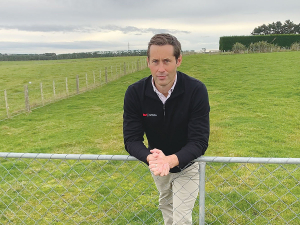Feds, Westpac butt heads over emissions reduction targets
Federated Farmers and a major Australian-owned bank are at loggerheads over emissions reduction targets set for New Zealand farmer clients.
 Westpac head of agribusiness Tim Henshaw says their new sustainable farm loan will help farmers on their journey to become more resilient food producers.
Westpac head of agribusiness Tim Henshaw says their new sustainable farm loan will help farmers on their journey to become more resilient food producers.
Westpac head of agribusiness Tim Henshaw says their new sustainable farm loan will help farmers on their journey to become more resilient food producers.
The new loan is the first in the country to accelerate sustainability across all aspects of farming and importantly covers all term debt associated with the farm.
A soft launch of the new loan was held at National Fieldays this month and Henshaw says the response from farmers has been "super positive".
"Every farmer we spoke to has been very positive and what resonated with them is the whole of farm approach," he told Dairy News.
"Under our loan, the whole farm will be considered a sustainable asset, not just one thing on the farm. That's a point of difference with other similar offerings in the market."
Once farmers sign up to the loan, they have two years to meet the sustainability standards. They get a discount in lending from day one with a 0.2% discount off the existing loan interest margin across all term debt associated with the farm. After meeting those standards within two years, their farm is considered sustainable.
Importantly, farmers can use existing compliance work already done on the farm to meet the standards and Henshaw says farmers love that provision.
Westpac, which already has sustainability offerings for institutional banking and residential customers, says agriculture is the next big cab off the rank.
"We believe agriculture is very important for New Zealand," Henshaw says.
Currently, the farming sector is facing challenges, dealing with climate change on farm and an avalanche of regulations coming their way.
"We believe our new loan will help farmers on their journey to reach sustainability goals," says Henshaw.
He says sustainability is becoming incredibly important with global customers and supply chains requiring stronger sustainability credentials from food producers.
"We think the bar will continue to go higher," he says.
The loan is structured to meet four key standards: plans and maps, environment and sustainability, animal welfare and people. Farms will be audited by AsureQuality.
Westpac NZ chief executive Catherine McGrath says the new sustainable farm loan is the first in the country to accelerate sustainability across all aspects of farming and importantly covers all term debt associated with the farm.
"With our newly launched Westpac Sustainable Farm Standard we are encouraging farmers and growers to improve sustainability practices and build more resilient farms.
"Our loan focuses on supporting our farming customers to assess and reduce on-farm vulnerability and risks that climate change and extreme weather events may have on the land, farming systems and infrastructure.
"We're also keen to encourage increased focus on farm management, waterway biodiversity and nutrient improvements on the farm, and understanding and managing agricultural emissions."
McGrath says Westpac has worked with AsureQuality to ensure that the Westpac Sustainable Farm Standard is robust and equivalent to all applicable aspects of the industry-agreed Sustainable Agriculture Finance Initiative guidance.
"We've also designed our Westpac Sustainable Farm Standard to complement farm assurance programmes that many of our customers are already using on-farm, to reduce duplication and reporting commitments for our customers.
"Our standard defines requirements that farmers need to meet, with a view to improving sustainability outcomes in areas like water management, application of fertiliser, waste management, climate change mitigation, adapting to climate change and better outcomes for biodiversity and soil health."
Irish meat processor Dawn Meats is set to acquire a 70% stake in Alliance Group, according to a report in The Irish Times.
New Zealand's red meat sector says the United States' decision to increase tariffs on New Zealand exports is disappointing.
Waikato-Bay of Plenty farmer Hugh Jackson recently secured this year’s FMG Young Farmer of the Year title in Invercargill.
From nitrogen limits to ecosystem restoration –farmers and catchment groups are leading a new wave of environmental care, says DairyNZ.
OPINION: The Government's decision to stop local authorities going ahead with reviews of district and regional plans makes sense for several reasons.
With June ending and following the most upbeat National Fieldays for several years, tractor dealers are reporting a lift in sales.
OPINION: Will synthetic milk derail NZ's economy?
OPINION: According to media reports, the eye-watering price of butter has prompted Finance Minister Nicola Willis to ask for a…